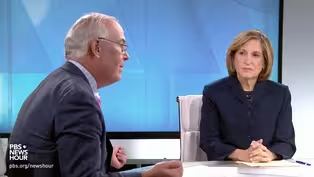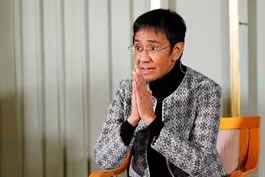
Job growth defies expectations but economic questions remain
Clip: 10/6/2023 | 5m 43sVideo has Closed Captions
Job growth defies expectations but questions remain about overall health of economy
The strength of the jobs market stunned again with a report surpassing most expectations. Employers added 336,000 jobs in September while unemployment remained at 3.8 percent. We also learned that nearly 120,000 more jobs were created in July and August than originally reported. Economics correspondent Paul Solman reports on the job market that continues to defy headwinds facing the economy.
Problems playing video? | Closed Captioning Feedback
Problems playing video? | Closed Captioning Feedback
Major corporate funding for the PBS News Hour is provided by BDO, BNSF, Consumer Cellular, American Cruise Lines, and Raymond James. Funding for the PBS NewsHour Weekend is provided by...

Job growth defies expectations but economic questions remain
Clip: 10/6/2023 | 5m 43sVideo has Closed Captions
The strength of the jobs market stunned again with a report surpassing most expectations. Employers added 336,000 jobs in September while unemployment remained at 3.8 percent. We also learned that nearly 120,000 more jobs were created in July and August than originally reported. Economics correspondent Paul Solman reports on the job market that continues to defy headwinds facing the economy.
Problems playing video? | Closed Captioning Feedback
How to Watch PBS News Hour
PBS News Hour is available to stream on pbs.org and the free PBS App, available on iPhone, Apple TV, Android TV, Android smartphones, Amazon Fire TV, Amazon Fire Tablet, Roku, Samsung Smart TV, and Vizio.
Providing Support for PBS.org
Learn Moreabout PBS online sponsorshipAMNA NAWAZ: Welcome to the "NewsHour."
The strength of the jobs market stunned again today with a report surpassing most expectations.
Employers added 336,000 jobs in September, while unemployment remained at 3.8 percent.
And we learned that nearly 120,000 more jobs were created in July and August than originally reported.
Paul Solman reports on a job market that continues to defy economic headwinds.
PAUL SOLMAN: This morning, a jobs report that blew expectations out of the water.
Economist Julia Coronado: JULIA CORONADO, MacroPolicy Perspectives: This was a blockbuster report.
We were on a slowing hiring trend through the last few months, and we just saw not only a great month of job creation in September, but upward revisions to July and August.
PAUL SOLMAN: Where is most of the growth coming from?
JULIA CORONADO: One of the encouraging things about this report is that its pretty broad-based.
So, the last couple of months, there was a very large hiring dominance by health care.
Now we're seeing manufacturing pick back up, state and local governments hiring teachers for the school year, retail adding jobs for the Christmas season.
PAUL SOLMAN: Leisure and hospitality, which hemorrhaged workers during the pandemic, finally returned to pre-COVID levels in September, adding 96,000 jobs, most of the gains in food and drinking places.
And yet persistent inflation, sky-high interest rates, strikes by autoworkers, actors, health care workers, plenty of evidence to support the idea of a two-faced economy.
JULIA POLLAK, ZipRecruiter: We have the economy taking divergent paths.
PAUL SOLMAN: Economist Julia Pollak.
JULIA POLLAK: So, we have parts of the economy that are growing and parts that are shrinking.
So, in states like New Jersey and California, for example, the unemployment rate has risen pretty substantially over the past year, while, in states like Maryland and Massachusetts, unemployment rates have fallen.
You see the same kind of divergence across industries.
PAUL SOLMAN: Economist Coronado agrees.
JULIA CORONADO: There's a lot of variation in the experiences of consumers.
PAUL SOLMAN: And some depends on age, says Coronado.
JULIA CORONADO: If you have wealth, you are much wealthier than before the pandemic.
But if you're a younger consumer, so you might have gotten strong wage gains -- in fact, younger consumers did get some of the strongest wage gains, but they're also likely to be renters.
And rents went up faster than almost any other price.
PAUL SOLMAN: So, no surprise, our call to find out how people are doing showed vastly different realities for folks of different ages in different places, two faces.
For example: JEANICE BLANCETT, Tennessee: Everything has gotten so much better.
It's just recently gotten back to the point of even a little better than pre-pandemic.
PAUL SOLMAN: Jeanice Blancett, who lives in Memphis.
she's turning 61 next week, and works as a freelance chef.
Yes, and it's people between your age and mine who in general are better off since the pandemic, right?
JEANICE BLANCETT: I have to tell you, Paul, everybody I know is doing better, even better than before.
I mean, everyone suffered greatly during it mentally, physically, economically.
PAUL SOLMAN: And things may be getting even better, as oil prices cratered this week.
On the other hand at the moment, in Pinellas County, Florida: CARMELA POLLICE, Florida: Just everything is expensive.
PAUL SOLMAN: That's what Carmela Pollice sees.
CARMELA POLLICE: My electric bill is almost three times higher.
My homeowners insurance, it's higher.
My flood insurance is almost double.
My utilities, such as my security system, is $25 more a month than before the pandemic.
PAUL SOLMAN: Now, multiple polls and the Consumer Confidence Index have shown that most Americans have been similarly down on the economy.
How come?
Unemployment near historically low levels, inflation moderating, economy growing.
So why are people so economically despondent?
JULIA CORONADO: Things are expensive.
So it doesn't -- while, from a macroeconomic standpoint, we're seeing reassuring signs of stabilization, it still is a very different environment for consumers than it was a few years ago.
PAUL SOLMAN: Even though wage gains have finally caught up with, even inched ahead of inflation some months.
But, says Julia Pollak: JULIA POLLAK: I think most people are comparing their fortunes either to the good times during the pandemic, when they were getting cash from Uncle Sam, when they were able to pay down their credit card debt, and when there were all kinds of government services available.
PAUL SOLMAN: Another factor, economic inequality, says Rebecca Riddell of Oxfam, the international anti-poverty organization.
REBECCA RIDDELL, Oxfam: As corporate profits have hit record highs and alongside decades of tax cuts for the wealthy and corporations, the very wealthiest have become dramatically richer.
PAUL SOLMAN: And by contrast?
REBECCA RIDDELL: Census figures out last month tell that story.
Last year, poverty jumped up as pandemic supports fell away, child poverty increased by record amounts, post-tax income inequality rose, and real wages fell.
PAUL SOLMAN: So, again, depending where you sit, the economy looks rocky or rosy.
But after today's report, says Julia Coronado: JULIA CORONADO: As a macroeconomist, it's hard to look at these numbers and see reasons for pessimism.
PAUL SOLMAN: We will soon see how many Americans agree.
For the "PBS NewsHour," Paul Solman.
Brooks and Marcus on GOP's after McCarthy's ouster
Video has Closed Captions
Clip: 10/6/2023 | 10m 38s | Brooks and Marcus on the future of the GOP after McCarthy's ouster (10m 38s)
Immigration advocates blast Biden after border wall decision
Video has Closed Captions
Clip: 10/6/2023 | 7m 40s | Immigration advocates criticize Biden after move allowing border wall construction (7m 40s)
Nobel Peace Prize bolsters activist's call for human rights
Video has Closed Captions
Clip: 10/6/2023 | 6m 52s | Nobel Peace Prize for jailed Iranian activist bolsters her call for human rights (6m 52s)
Nobel winner Maria Ressa on A.I dangers and defending truth
Video has Closed Captions
Clip: 10/6/2023 | 6m 50s | Nobel laureate Maria Ressa on defending truth and the danger of A.I. in the wrong hands (6m 50s)
Tourism in Maui sparks debate over community and economy
Video has Closed Captions
Clip: 10/6/2023 | 9m 19s | Return of tourism in West Maui sparks debate over grieving community and fragile economy (9m 19s)
Providing Support for PBS.org
Learn Moreabout PBS online sponsorship
- News and Public Affairs

FRONTLINE is investigative journalism that questions, explains and changes our world.

- News and Public Affairs

Amanpour and Company features conversations with leaders and decision makers.












Support for PBS provided by:
Major corporate funding for the PBS News Hour is provided by BDO, BNSF, Consumer Cellular, American Cruise Lines, and Raymond James. Funding for the PBS NewsHour Weekend is provided by...




